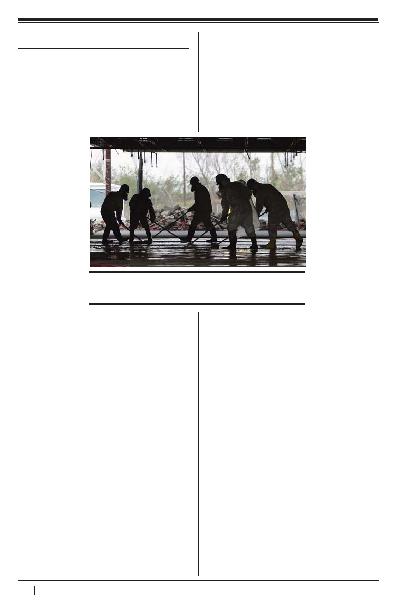
20 C L
.
white community is now being used by God to
bring hope to Katrina survivors in Biloxi.
Another story Redfern tells happened on
one of the days that he and the volunteers from
Compassion Central went to help clean up the
churches. Many churches had been reduced to a
pile of rubble, but there were a few churches that
were left standing with walls even though the
oodwaters had
reached the roof-
line inside. Red-
fern looked at me
with a twinkle in
his eye. I knew
that he had an-
other
good
story to relate.
"Gladys," he
said, "it is awe-
some to be a part
of Compassion
Central here in
Biloxi. is tent
city with vol-
unteers from all
across the nation
- this "City of God" with people from every
walk of life and every denomination - some-
thing so wonderful that even the heathen no-
tice what is happening."
"What do you mean, Redfern?" I asked.
"Oh, Gladys. You should have been here the day
that we went to the Vietnamese community. We
found the priest at the Vietnamese Catholic church
and asked him if we could help him clean up his
church. When the priests from the Buddhist tem-
ple next door noticed that we had arrived in the yard
of the Catholic Church, they came outside and drew
a line in the dirt and asked us not to cross over. ey
said that they had to remain separate from us."
My facial expression gave away the sadness
I was feeling at the moment, but then, Redfern
began to laugh.
" at's all right, Gladys. We had to respect
their wishes, but listen to the ending."
e rhythm in his voice picked up as he said,
"We left rice and supplies in the yard of the
Catholic Church and cleaned out about a foot
of mud from inside. When the Vietnamese
Buddhists saw what we had done for the Viet-
namese Catholics, they sent a note to us asking
if we would help them too."
" at's great, Redfern," I said. "What did
you do for them?"
Redfern's eyes were twinkling even more
now as he responded, "The same thing.
We gave them rice and supplies, and
helped clean out the mud in the Bud-
dhist temple. And at the end of the day,
they wanted to know about the God that we
served. They wanted to know what kind of
God we worshipped that would allow us to
help them after
they had drawn
a line and asked
us not to cross
over."
"You know
what, Gladys?"
"What, Red-
fern," I answered
eagerly. I had
learned to expect
the unexpected.
R e d f e r n
couldn't wait to
share the rest.
"Because we min-
istered to them,
they opened up
to other relief groups who came to Biloxi to help
survivors. Oh, it's wonderful, Gladys. It's won-
derful."
Redfern talked freely about what it meant
for him to be a part of the move of God that is
taking place at Compassion Central in Biloxi.
He said, "It is wonderful to know that God
sent me here. It's wonderful just to know that I
don't have to have any kind of degree to be here.
It's wonderful just to see ordinary people doing
extraordinary things in ordinary ways."
I was fascinated by Redfern's comments and
wasn't quite sure what he meant about `ordinary
people doing extraordinary things in ordinary
ways', so I asked him what he meant.
"Well," he said. "One person shoveling mud
out of a house or church is ordinary, but to see
1000 people shoveling mud out of churches and
houses ah, that's extraordinary."
And just to make sure that I understood, he
said it again, "Yes, it's awesome to see ordinary
people doing extraordinary things in ordinary
ways." And then he added some; a comment that
only Redfern would think of: "It's also awesome
to see T-bone steaks being served in the middle
of disaster and to see little ole feisty grandmothers
"Yes, it's awesome to see ordinary people doing
extraordinary things in ordinary ways."
Hurricane Katrina &
e Storm of Gods Love

